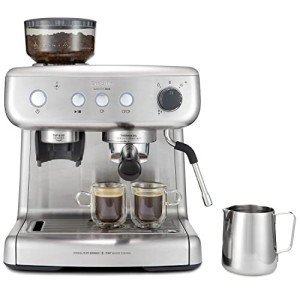The World of High-Quality Espresso Machines: A Comprehensive Guide
Espresso has ended up being a beloved beverage among coffee lovers worldwide, understood for its rich taste, extreme fragrance, and adaptability. The heart of an excellent espresso depends on the machine utilized to brew it. High-quality espresso machines are developed to deliver the ideal shot, making them a necessary investment for coffee fans. This post explores numerous types of high-quality espresso machines, their features, maintenance pointers, and responses to often asked questions.
Kinds Of High-Quality Espresso Machines
High-quality espresso machines fall under several classifications, accommodating various choices, ability levels, and spending plans. The main types consist of:
| Type of Machine | Description | Ideal User |
|---|---|---|
| Manual Espresso Machines | Needs user skill to manage extraction and pressure. Uses the most control over the brewing process. | Experienced baristas and lovers |
| Semi-Automatic Machines | Combines manual operation with automation. Users manage the grind and tamping, while the machine handles water dispersion. | Intermediate users |
| Automatic Espresso Machines | Automate the developing procedure, enabling programmable brewing times and temperature levels. | Casual coffee drinkers |
| Super-Automatic Machines | Have built-in mills and are completely automated, handling whatever from grinding to developing and steaming. | Users seeking convenience |
| Commercial Espresso Machines | Designed for high volume use in coffee shops and dining establishments, offering sturdiness and speed. | Business owners |
Detailed Overview of Each Type
Manual Espresso Machines
- Pros: Complete control over the developing procedure; can produce exceptional quality espresso.
- Cons: Requires significant ability; lengthy.
Semi-Automatic Machines
- Pros: Balanced control, blending manual and automatic procedures; exceptional quality espresso is still attainable.
- Cons: Requires some knowledge and experience to master.
Automatic Espresso Machines
- Pros: User-friendly; lowers the learning curve while still producing high-quality espresso.
- Cons: Still needs some understanding of coffee-making fundamentals.
Super-Automatic Machines
- Pros: Maximal convenience; little ability needed; perfect for individuals or families who desire coffee without difficulty.
- Cons: Higher cost point; might do not have the fine-tuning abilities of manual machines.
Commercial Espresso Machines
- Pros: Built for longevity and efficiency; often consists of functions for high-volume turns.
- Cons: Expensive; may be overkill for home use.
Secret Features to Consider
When looking for a high-quality espresso machine, several essential features ought to be taken into account:
- Pressure and Pump Type: Look for machines with at least 9 bars of pressure, which is essential for extracting the best taste from coffee beans.
- Boiler Type: Single, double, and heat exchanger boilers each impact how the machine carries out and the speed of developing.
- Build Quality: High-quality materials such as stainless steel are more suitable for sturdiness and looks.
- Ease of Use and Cleaning: Some machines require comprehensive cleansing, while others are developed for simple upkeep.
- Temperature Control: Consistent temperature is critical; consider machines with PID controllers for precise control.
Benefits of High-Quality Espresso Machines
Investing in a high-quality espresso machine offers a multitude of advantages:
- Superior Quality: High-end machines permit higher control, leading to more delicious espresso.
- Toughness: Built to last, quality machines require fewer repair work and replacements.
- Personalization: Users can enjoy a tailored experience by adjusting grind size, shot timing, and other settings.
- Increased Convenience: Automatic and super-automatic options permit fanatics to enjoy espresso with minimal effort.
Maintenance and Care for High-Quality Espresso Machines
To keep an espresso machine working optimally, routine maintenance is essential. Here are ideas for keeping a high-quality espresso machine:
Descale Regularly:
- Use a descaling solution every couple of months to avoid accumulation of minerals from water, which can affect flavor and performance.
Clean the Brew Group:
- For machines with a removable brew group, clean it routinely to ensure a tidy extraction.
Change Water Filters:
- Use a water filter and alter it as needed to minimize impurities in your brewing water.
Daily Cleanings:
- Rinse the portafilter and group head after each use to prevent oil accumulation.
Watch on the Parts:
- Monitor seals, gaskets, and other parts for wear and tear and change them as necessary.
Regularly Asked Questions (FAQs)
1. What is the very best espresso machine for beginners?
For newbies, a semi-automatic machine typically provides a good balance of use and control, enabling users to learn the skills necessary for making excellent espresso.
2. Are super-automatic machines worth the investment?
Yes, for those who prioritize convenience and ease over control, super-automatic machines can be a deserving investment, particularly for families or busy specialists.
3. How much should I anticipate to invest in a high-quality espresso machine?
High-quality espresso machines vary considerably in cost, with manual machines beginning at a couple of hundred dollars, while super-automatic or commercial machines can surpass several thousand.
4. Can Buy Espresso Coffee Machines make other coffee drinks with an espresso machine?
Yes, numerous espresso machines have steam wands or attachments that allow users to produce lattes, cappuccinos, and more.
5. For how long do espresso Best Espresso Machines ?
With appropriate maintenance, high-quality espresso machines can last over a decade, making them a long-lasting financial investment in your coffee enjoyment.
High-quality espresso machines yield a transformative coffee experience, whether taken pleasure in in the house or in a commercial setting. By comprehending the types offered, their functions, and the maintenance needed to keep them running effectively, consumers can make educated choices that elevate their coffee-drinking experience.

